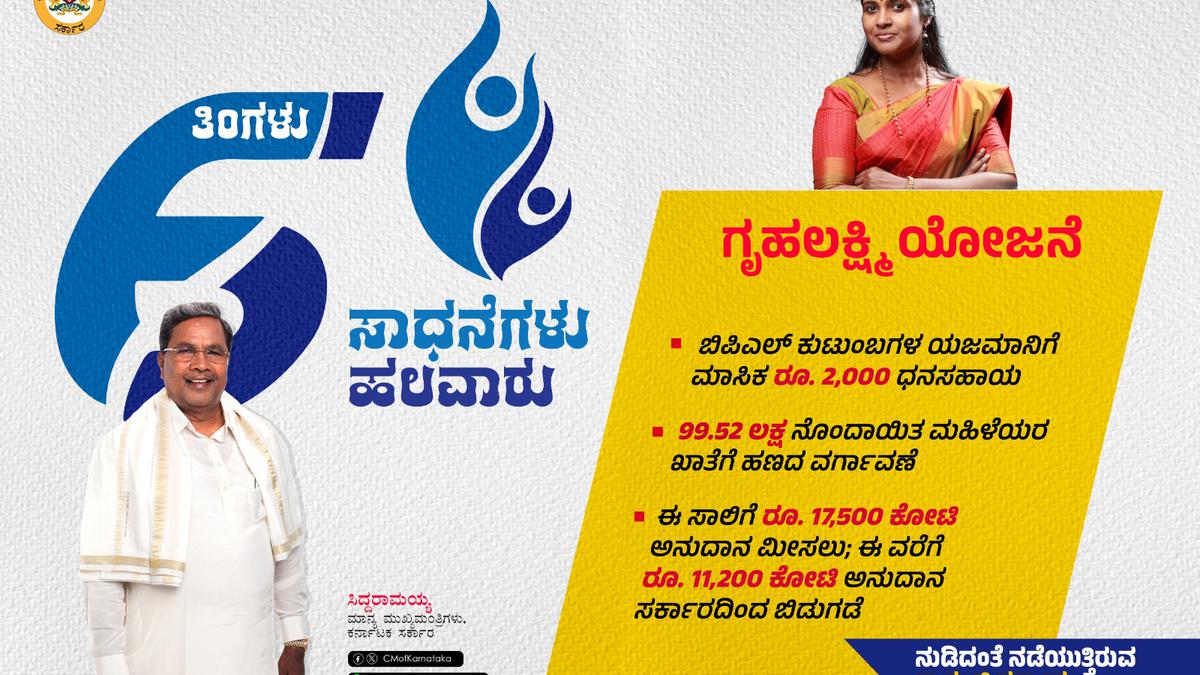
Karnataka’s Gruha Lakshmi scheme is not a freebie Premium
The Hindu
Karnataka’s Gruha Lakshmi scheme signifies a redistribution of resources by the government to a marginalised section
The introduction of the Gruha Lakshmi scheme by the Karnataka government has reignited the policy debate about welfare programmes for the economically disadvantaged and fiscal prudence. The scheme guarantees a direct monthly cash transfer of ₹2,000 to women who are the heads of below poverty line households in Karnataka. About 1.36 crore beneficiaries are registered. This means that the annual outlay of the scheme is more than ₹32,000 crore.
Mainstream economics does not recognise activities primarily carried out by women at home as economic activities. Unpaid work encompasses domestic chores such as cooking and washing, while care work involves caring for the elderly and children. The participation of women in remunerative economic activity is abysmally low, while their burden of unpaid work is substantially higher than men. According to the Time Use survey conducted by the National Statistical Office, 57.3% of male respondents were involved in employment and related activities compared to 18.4% of women. In contrast, 81.2% of women bore the burden of unpaid domestic services for household members compared to 26.1% of men.
Further, the burden of unpaid and care work is disproportionately higher for economically poor women who are also engaged in wage work, as they lack the resources to outsource care activities. Thus, they are trapped in a cycle of poverty. The Gruha Lakshmi scheme represents a crucial step in recognising the value of unpaid work. As urbanisation grows and the population ages, the burden of elderly care is expected to increase, especially for impoverished families. Income support from the state can alleviate the strain on such families. In this context, monetary support to women cannot be seen as a ‘freebie’; it is an entitlement for the care work that women do, especially women who face multidimensional and time poverty.
In a patriarchal economic system, women are often paid low wages, which they reluctantly accept due to their limited bargaining power. Unconditional cash support not only helps women decontrol their labour power from the system to an extent, but possibly provides some cushion to resist accepting reservation wages by enhancing their bargaining power.
Empirical evidence supports cash transfers to households in stimulating aggregate demand and putting the economy back on a growth trajectory rather than providing sops and bailout packages to the corporate sector to revive it. For instance, according to a study by IFPRI-Indian Council for Agricultural Research, PM-KISAN, a direct benefit transfer scheme of the Union government, enabled farmers to meet expenses other than agriculture and had a multiplier effect. Direct support measures, including cash transfers to households by the Union government during the COVID-19 pandemic, led to a swift V-shaped recovery of the economy. The Gruha Lakshmi scheme is also poised to bolster aggregate demand given its target group’s relatively high marginal propensity to consume. Consumption improves quality of life and also boosts economic activities.
The scheme signifies a redistribution of resources by the government to a marginalised section of society, recognising unpaid work. Nonetheless, ensuring that resources to finance the scheme are augmented from direct taxes, such as levies on high-value property and capital transactions and excise taxes on premium liquor, is crucial. Prudent administrative measures to trim unnecessary expenditures can provide additional resources to ensure timely and uninterrupted cash transfers. Therefore, a transparent and well-thought-out road map for resource augmentation is indispensable. While fiscal prudence is necessary, it must not come at the expense of the welfare of the marginalised.
It is naïve to consider Gruha Lakshmi as a panacea for gender inequality. There is a need to universalise such support to women in recognition of their unpaid and care work. A comprehensive institutional framework at the national and sub-national levels and cooperative federalism are indispensable to address gender inequality in the economy and ensure redistribution.

Identity cards of delivery executives blocked by aggregator companies after they take part in strike
Delivery executives in Bengaluru face ID blocking by aggregator companies after participating in a nationwide strike for workers' rights.












